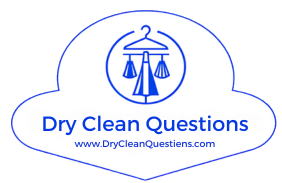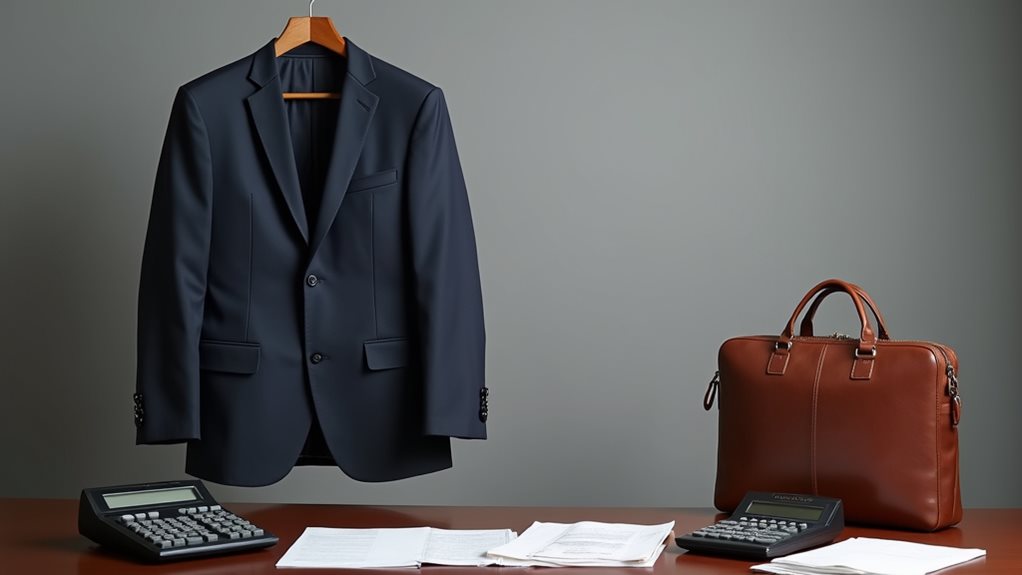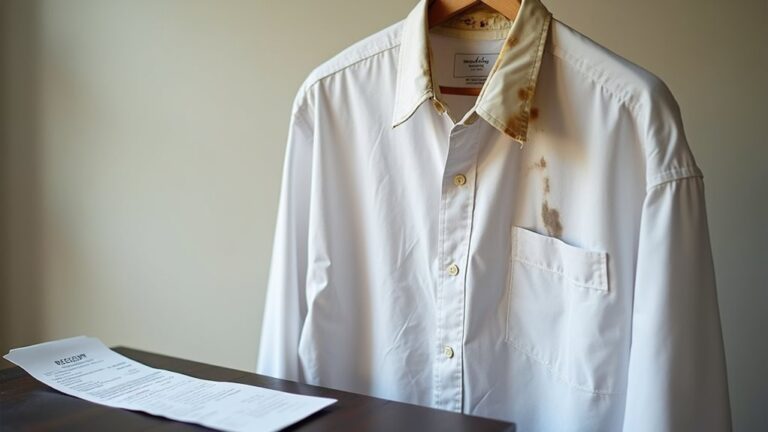You can deduct dry cleaning expenses as a business cost, but only if your clothing meets the IRS’s strict two-prong test—it must be required by your employer AND unsuitable for everyday wear. Think specialized uniforms or protective gear, not your regular business suits. If you’re self-employed, you’ll have more flexibility than employees, who’ve faced restrictions since 2018. The key is meticulous documentation and understanding that state rules might offer additional opportunities beyond federal guidelines.
Understanding IRS Requirements for Clothing Deductions
Why does the IRS make claiming clothing expenses feel like traversing a maze blindfolded? 😅
When I first started my consulting business, I naively thought I could deduct every suit dry cleaning bill since I wore them to client meetings, but the IRS has surprisingly strict rules that’ll quickly deflate those hopes.
Here’s the reality: the IRS applies a brutal two-prong test for clothing deductions that’ll crush most business expenses dreams.
Your work clothing must be specifically required by your employer AND completely unsuitable for everyday wear – both conditions, no exceptions.
That expensive suit you’re wearing to impress clients? Unfortunately, it’s still suitable for everyday wear, which means your dry cleaning expenses won’t qualify as legitimate business expenses, even though you exclusively use it for work meetings and client presentations.
However, if you’re required to wear specialized uniforms with company logos, protective gear, or performance costumes, you’ll need to maintain detailed receipts and records proving these items serve an exclusive work-related purpose.
The Two-Prong Test for Business Attire

Although the IRS’s two-prong test sounds deceptively simple on paper, I’ve watched countless business owners stumble over its nuanced requirements, mistakenly assuming that wearing something exclusively for work automatically makes it deductible.
Here’s where the Two-Prong Test gets tricky: your clothing expenses must satisfy both conditions simultaneously. First, your employer must require the specialized work attire, and second, it can’t be suitable for everyday wear.
Both prongs must be met simultaneously—employer requirement AND unsuitability for everyday wear—or your deduction fails completely.
I’ve seen entrepreneurs confidently deduct dry cleaning costs for expensive business suits, only to face non-deductibility during audits 😬. The IRS regulations are crystal clear—if you can wear it to dinner or shopping, it doesn’t qualify.
However, uniforms and truly specialized work attire that meet both prongs can make your dry cleaning expenses legitimate deductible business expenses. Self-employed individuals may have more flexibility in claiming these dry cleaning expenses as business deductions compared to employees who face stricter limitations.
When Dry Cleaning Expenses Qualify as Deductible

When your dry cleaning receipts start piling up each month, you’re probably wondering which ones can actually reduce your tax burden.
I’ve learned through years of helping clients steer through these murky waters that the answer depends entirely on whether your garments pass those strict IRS criteria we just discussed.
Your dry cleaning expenses become deductible business expenses when your clothing is exclusively for work and meets specific employer requirements.
Self-employed individuals can claim these costs too, provided their specialized clothing or employee uniforms qualify under the same rules.
Regular business suits and everyday professional clothing typically cannot be deducted since they serve dual purposes for work and personal use.
The key is maintaining proper documentation for audit substantiation – trust me, you’ll thank yourself later when those receipts save you hundreds!
Professional Uniforms vs. Business Suits
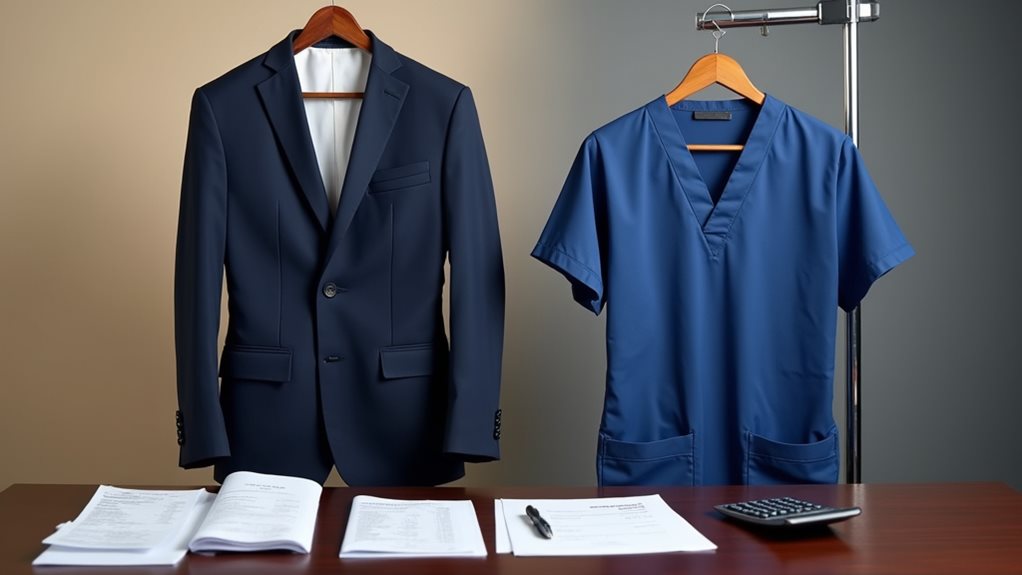
The distinction between professional uniforms and business suits creates one of the most confusing areas I encounter when helping people understand their dry cleaning deductions, and frankly, it’s where I’ve seen countless well-meaning taxpayers make expensive mistakes that could’ve been easily avoided.
Here’s the key difference: professional uniforms worn by nurses, mechanics, or security guards typically meet IRS criteria because they’re specialized clothing unsuitable for everyday wear, making their dry cleaning costs deductible business expenses.
However, your sharp business suits, despite being work attire worn exclusively in professional settings, don’t qualify since they’re considered suitable for ordinary street wear.
The IRS treats these dry cleaning expenses as personal expenses, rendering them non-deductible regardless of how much you spend maintaining that polished appearance.
Additionally, if you do qualify for dry cleaning deductions, you’ll need to meet specific documentation requirements and may face percentage limitations based on your adjusted gross income.
Self-Employed vs. Employee Deduction Rules

Since I started helping clients steer through the maze of tax deductions fifteen years ago, I’ve watched the rules around dry cleaning expenses create a frustrating divide between self-employed individuals and traditional employees.
Honestly, it’s one of those situations where your employment status can make or break your ability to claim these costs.
Here’s how the deduction framework currently breaks down:
- Self-employed individuals can deduct dry cleaning for work attire that meets IRS criteria and isn’t suitable for ordinary street wear.
- Employee deductions have been suspended since 2018 on federal tax returns, potentially until 2026.
- Documentation requirements apply to both groups, requiring proper receipts and records.
- State tax rules may still allow employee deductions, so check your local regulations.
Your employment classification fundamentally determines your dry cleaning business expenses eligibility.
The distinction between personal and business clothing can be complex, which is why maintaining detailed records becomes crucial for substantiating any dry cleaning deductions you claim.
State Tax Considerations for Dry Cleaning Costs
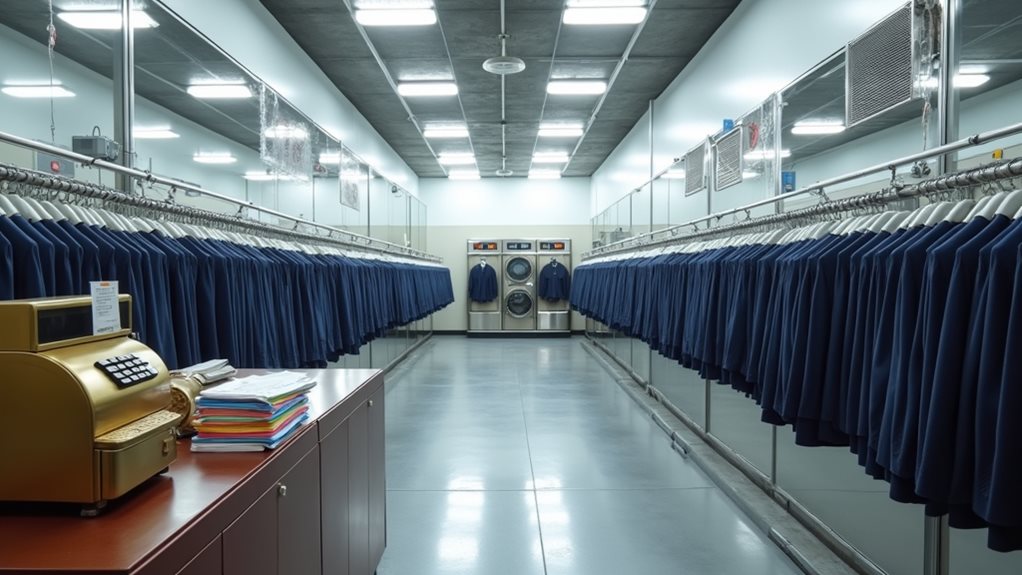
While federal tax laws might’ve slammed the door on dry cleaning deductions, your state could be rolling out the welcome mat with completely different rules that actually work in your favor.
I learned this the hard way when I assumed my expensive suit cleaning costs were a lost cause everywhere, only to discover later that my state hadn’t followed the federal suspension and I’d missed out on legitimate deductions for two whole years 🤦♀️.
You’ll want to check your specific state’s policies carefully, because some states march to their own drum when it comes to these deductions, creating opportunities that many taxpayers don’t even realize exist.
Since dry cleaning for specialized uniforms or work-specific attire that cannot be worn for everyday purposes may still qualify as legitimate business expenses, it’s crucial to understand both your state’s stance and the specific nature of your clothing.
State-Specific Deduction Rules
Although federal tax laws might’ve you feeling like your dry cleaning deductions vanished into thin air, many states march to their own drummer when it comes to these expenses.
Honestly, this disconnect between federal and state regulations reminds me of trying to coordinate dinner plans with my extended family – everyone’s operating under different rules!
Here’s what you need to know about state-specific deduction rules:
- Self-employed individuals can often claim dry cleaning deductions on state returns despite federal restrictions.
- Required business attire may qualify as deductible expenses in certain states for businesses.
- State tax regulations frequently offer unique opportunities unavailable under federal law.
- Local tax codes vary dramatically, making research absolutely crucial.
Don’t assume your state follows federal guidelines – check those specific state tax rules!
Remember that even for smaller dry cleaning expenses, maintaining an expense log with dates, amounts, and business justification helps support your state deduction claims.
Non-Conforming State Policies
When states decide to buck federal tax trends, it’s like watching your rebellious cousin at Thanksgiving dinner – they’re doing their own thing, and frankly, it might work out better for everyone involved! 😊
Several states have chosen not to conform to the federal suspension of dry cleaning deductions, creating a patchwork of opportunities that can genuinely surprise taxpayers who assume their state automatically mirrors federal restrictions.
These non-conforming state policies mean you’ll need to research your specific state tax laws carefully, because what’s disallowed federally might still qualify as legitimate business expenses on your state return.
Self-employed individuals often discover they can still deduct specialized clothing and uniforms at the state level, even when federal restrictions apply, potentially generating meaningful tax savings if you meet the eligibility criteria.
Remember that regardless of state policies, maintaining detailed logs or supporting documentation remains crucial to substantiate your dry cleaning expense claims, especially since the burden of proof stays with you during any potential audit situation.
Proper Documentation and Record Keeping

The difference between successfully claiming your dry cleaning expenses and facing a tax audit nightmare often comes down to one simple thing: keeping meticulous records that tell the complete story of your business needs.
Here’s your crucial documentation checklist for dry cleaning deductibility:
Your dry cleaning deduction success hinges entirely on maintaining proper documentation that satisfies IRS requirements and audit scrutiny.
- Save every receipt and invoice – these prove your actual expenses occurred
- Keep corresponding bank statements – they verify payment and timing
- Maintain detailed logs – note the business purpose for each cleaning expense
- Store records for three years minimum – IRS requirements don’t mess around
I’ve learned the hard way that proper documentation isn’t just about shoving receipts in a drawer 😅.
You’ll want everything organized and easily accessible, because when audit season arrives, you’ll need to demonstrate how each business expense meets IRS criteria.
When documenting your dry cleaning costs, be sure to note specific details like garment type and any special treatments, as these factors can justify varying expense amounts to tax authorities.
Consider consulting a tax professional for guidance on record keeping best practices.
Common Mistakes to Avoid When Claiming Clothing Expenses
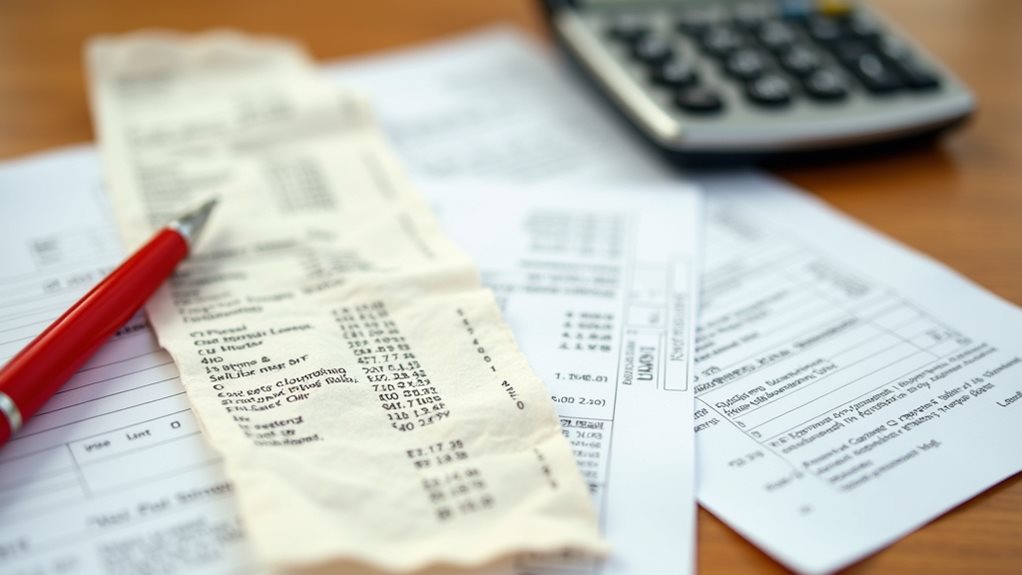
Even seasoned business owners stumble into costly pitfalls when claiming clothing expenses, and I’ve watched countless entrepreneurs learn these lessons the expensive way during tax season.
The biggest mistake? Claiming dry cleaning expenses for everyday clothes that you could wear to dinner or shopping 🙄. The IRS demands that deductible clothing be unsuitable for street use, meaning uniforms, protective gear, or specialized clothing only.
You’ll also crash and burn if you don’t document expenses properly—keep those receipts for three years minimum!
Another common blunder involves mixing personal and business use; dual-purpose items don’t qualify. Remember, your employer must mandate specific attire as a condition of employment, otherwise those tax implications could sting unexpectedly.
Given the complexity of these regulations, it’s wise to consult with a tax professional to ensure you’re following current IRS guidelines correctly.
